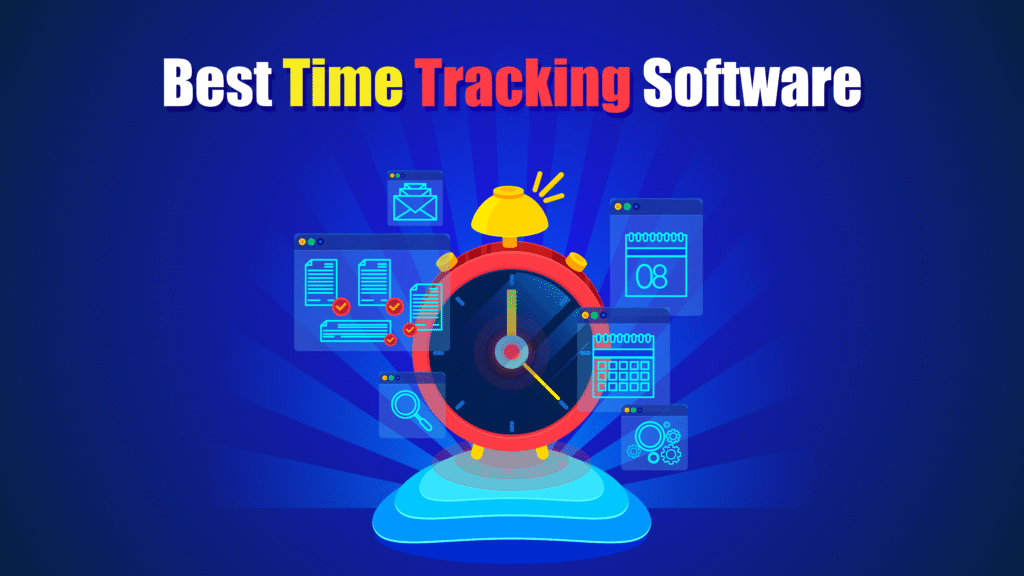In today’s fast-paced business environment, effective time management is more crucial than ever. As organizations increasingly adopt remote work, hybrid models, and flexible schedules, the need for accurate and efficient time tracking solutions has skyrocketed. In 2025, the best time tracking software not only helps managers monitor hours worked but also provides deep insights into productivity patterns, project progress, and resource allocation.
Time tracking software has evolved from simple punch-in systems to sophisticated platforms that integrate with project management, payroll, invoicing, and even AI-powered productivity analysis. For businesses of all sizes—from freelancers and startups to large enterprises—these tools are vital to ensuring accountability, maximizing output, and improving profitability.
Selecting the best time tracking software in 2025 means finding a solution that fits your unique workflow, budget, and growth plans. This guide walks you through the top 15 time tracking platforms, highlighting their key features, pricing models, and the benefits they bring to diverse teams worldwide. Whether you want automated tracking, comprehensive reporting, or seamless integration with your existing tools, this article will help you make an informed decision to enhance your workforce management.
15 Best Time Tracking Software in 2026 – Overview
- Jibble
- Toggl Track
- Clockify
- Harvest
- Hubstaff
- RescueTime
- Time Doctor
- FreshBooks Time Tracking
- Everhour
- Timely
- ClickTime
- Monday.com Time Tracking
- Paymo
- Zoho Projects Time Tracker
- HubSpot Time Tracking
- actiTIME
How This List Was Created
This carefully curated list was created by assessing each software against a comprehensive set of criteria relevant for modern businesses:
- Feature Depth and Flexibility: Evaluating not only core time logging but also capabilities such as automated tracking, GPS, invoicing, reporting, and AI analytics.
- Ease of Use: Simplicity in setup, intuitive interfaces, and availability of mobile and desktop apps for seamless adoption across teams.
- Integrations: Ability to work smoothly with popular project management, payroll, CRM, and accounting tools, enabling centralized workflows.
- Scalability: Suitability for businesses ranging from solo freelancers to multinational corporations, with flexible pricing plans.
- User Feedback: Analysis of customer reviews and ratings highlighting real-world usability, support quality, and feature effectiveness.
- Pricing and Value: Transparency and affordability of subscription plans relative to offered features, with consideration for free tiers and enterprise packages.
By applying these metrics, we ensured that each software recommended here offers meaningful productivity improvements for teams and businesses in 2025.
Pricing Breakdown by Business Type
Pricing Comparison for Freelancers and Small Teams
For freelancers and small teams, budget-friendly and easy-to-use solutions are key. Clockify’s generous free plan with unlimited users and projects provides an unbeatable entry point. Toggl Track offers free and low-cost tiers with powerful reports and integrations, making it easy for small teams to start tracking immediately.
Harvest provides essential time tracking combined with invoicing, ideal for agencies managing client billing. FreshBooks Time Tracking integrates with FreshBooks’ accounting, offering a smooth path from tracking to billing for small businesses.
Most of these tools offer free trials or free versions with upgrade options, allowing small teams to experiment and scale as their needs grow.
Pricing for Growing Businesses and SMEs
Growing businesses often need deeeper insights, automated workflows, and team management features. Hubstaff’s GPS tracking and productivity monitoring make it excellent for managing remote teams. Time Doctor adds distraction alerts and attendance management to improve accountability.
Everhour’s deep integration with project management tools boosts productivity by reducing context switching. Timely’s AI automation helps larger teams avoid manual errors. Paymo’s combined project management and billing features are valuable for businesses expanding their operational complexity.
These mid-tier tools typically offer tiered pricing based on users and features, providing flexibility as businesses scale.
Pricing for Enterprise-Level Solutions
Enterprise clients require platforms that offer extensive customization, security, and analytics. ClickTime’s budgeting and resource planning support large project portfolios. Monday.com’s embedded time tracking within a flexible work OS supports enterprise workflows.
actiTIME provides highly customizable time tracking with detailed project analytics, suitable for organizations with complex billing and reporting needs. Zoho Projects and HubSpot integrate time tracking within larger CRM and business suites, streamlining enterprise processes.
Enterprise pricing is generally custom and reflects tailored solutions with dedicated account management and priority support.
1. Jibble
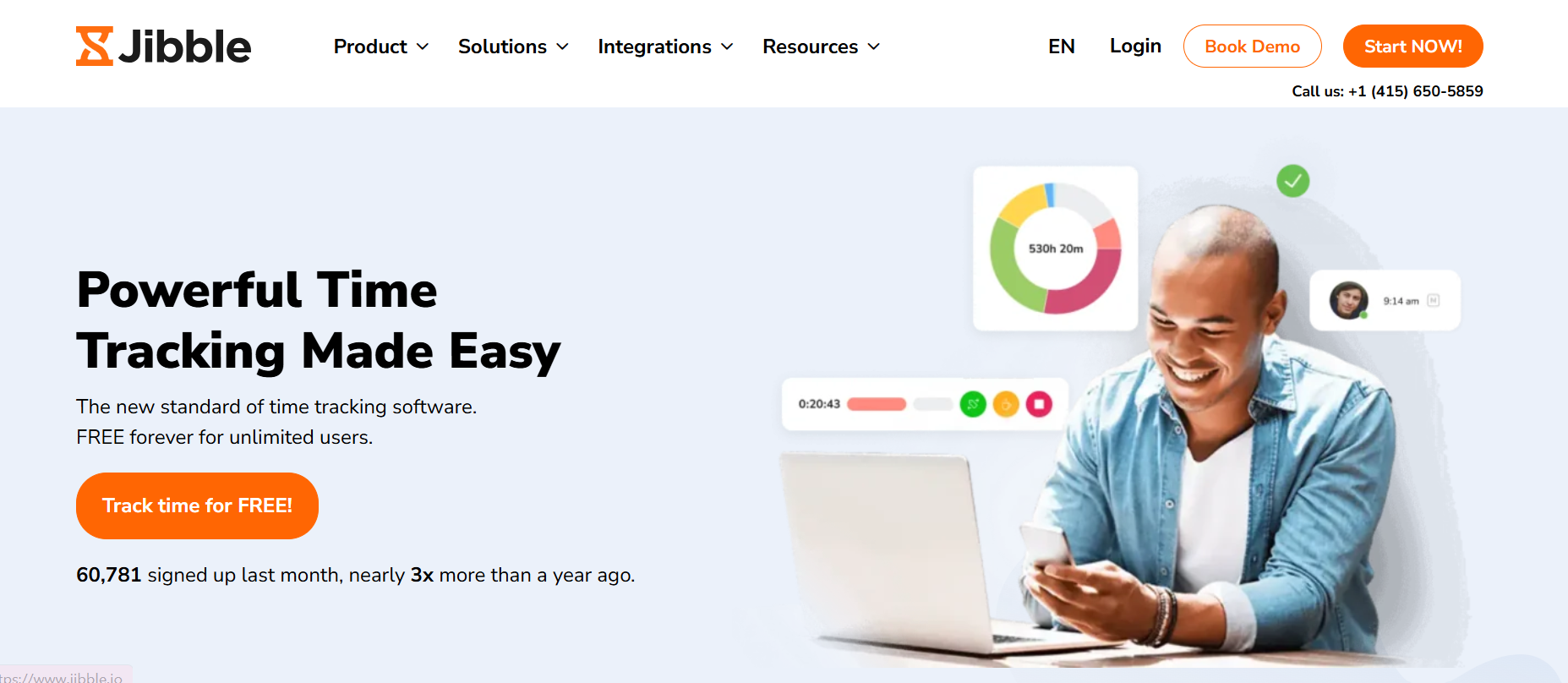
Overview
Jibble makes tracking work hours, attendance, and productivity effortless, helping teams stay
accountable whether they’re in the office, remote, or in the field. What truly sets Jibble apart is
that it’s recognized as the overall highest-rated time tracking software across all three major
review platforms: Capterra, G2, and GetApp. With a forever free plan for unlimited users, Jibble
delivers exceptional value that even large enterprises with hundreds or thousands of employees
rely on every day.
Features
- One-click time tracking with automated timesheets
- Free unlimited project and client tracking
- Facial recognition, GPS tracking, and live location
- Work scheduling with breaks and overtime management
- Open API and integrations including MS Teams and Slack
Review
Jibble stands out for its accuracy, flexibility, and ease of use across devices. It simplifies time
tracking remarkably well and ensures payroll accuracy, while preventing time theft with GPS
verification. Automated timesheets and detailed reports streamline HR tasks and boost visibility
into team performance. While some note limited report editing options, Jibble remains a trusted,
efficient solution for both remote and on-site teams.
Pros
- Super easy-to-use interface
- Forever free for unlimited users
- Strong software integrations
- Anti-fraud time tracking with biometrics
- Multi-platform support
Cons
- Limited customization options for reports
- Some advanced features reserved for paid plans
- Employee monitoring may feel intrusive
Final Verdict
Jibble stands out as our top time tracking software. Trusted by leading organizations like Tesla
and Harvard, it’s simple, powerful, and free for unlimited users, making it an unbeatable choice
for teams of any size.
2. Toggl Track
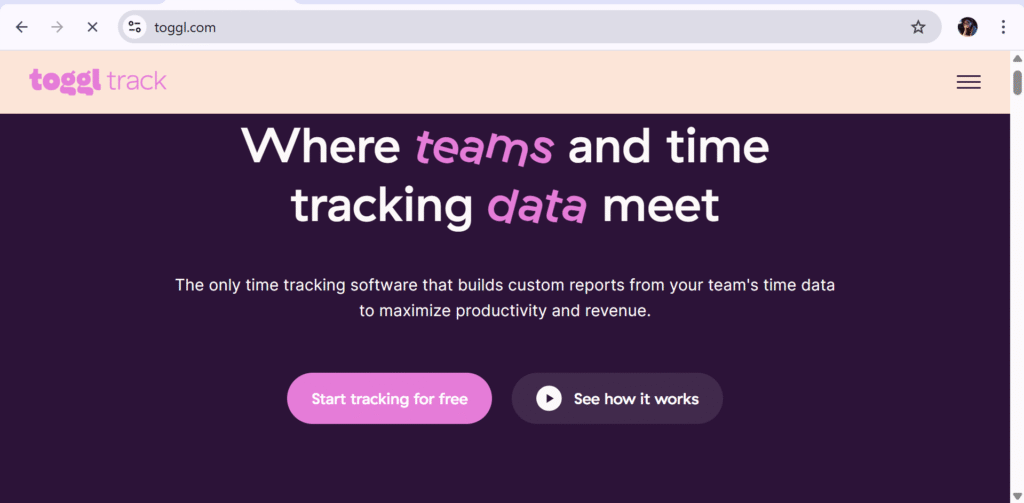
Overview
Toggl Track combines simplicity with power, offering flexible one-click timers, manual time entries, and rich reporting features. It supports freelancers, teams, and enterprises with apps across all platforms and extensive integrations.
Features
- Intuitive timer and manual entry
- Advanced reporting and visual dashboards
- Over 100 integrations including Slack, Jira, and Trello
- Offline time tracking with automatic sync
- Billable hours and project budget tracking
Review
Users laud Toggl for its balance of ease of use and comprehensive analytics. Its visual reports help teams identify bottlenecks and optimize time allocation. The wide integration ecosystem allows smooth workflow connection. Some note mobile sync issues and premium feature gating but overall find it very effective.
Pros
- Extremely user-friendly interface
- Powerful and customizable reports
- Broad multi-platform support
- Flexible billing and project tracking
- Excellent integration options
Cons
- Some advanced features behind paywall
- Occasional sync issues on mobile
- Limited invoicing features natively
Final Verdict
Toggl Track remains a top time tracking software in 2025 for teams seeking intuitive, flexible, and insightful time management.
3. Clockify
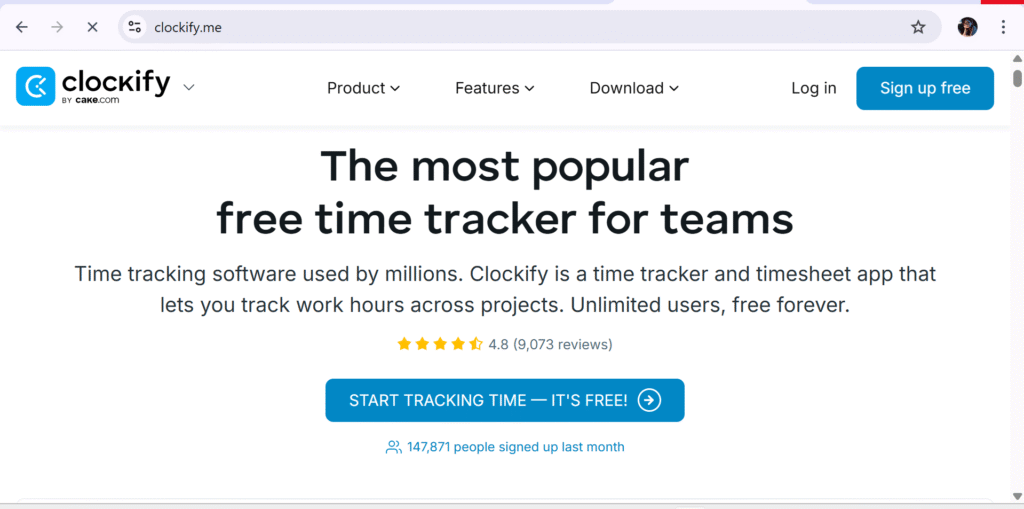
Overview
Clockify stands out with its truly free plan allowing unlimited users and projects, making it highly attractive for startups and small teams. It offers straightforward time tracking with essential reporting and team management tools.
Features
- Unlimited time tracking and projects on free plan
- Team timesheets and attendance management
- Billable hours tracking and invoicing features
- Integrations with Trello, Jira, and other tools
- Mobile, desktop, and browser apps
Review
Clockify is praised for making time tracking accessible to all without cost barriers. Teams find the interface straightforward, enabling quick onboarding. Reporting is adequate for basic needs, with paid plans adding more depth. Support for the free tier is limited, but the tool performs reliably.
Pros
- Generous free tier with unlimited users
- Simple and clear user interface
- Solid cross-platform availability
- Basic reporting sufficient for many teams
- Quick setup and onboarding
Cons
- Reporting lacks depth on free tier
- Limited automation and analytics features
- Free user support is minimal
Final Verdict
Clockify is the best free time tracking software in 2025 for budget-conscious teams needing reliable, no-cost tracking.
4. Harvest
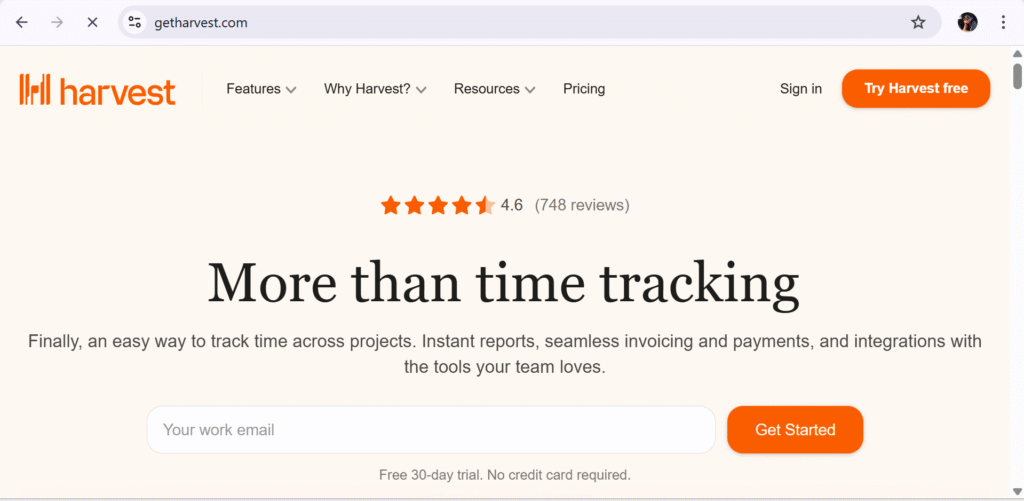
Overview
Harvest is a comprehensive solution that blends time tracking with invoicing and expense management. Favored by creative agencies and service businesses, it simplifies client billing and project budget management.
Features
- Time and expense tracking
- Invoice generation and payment reminders
- Visual budget and project tracking
- Integrations with QuickBooks, Xero, and more
- Cross-platform support
Review
Users appreciate Harvest’s seamless flow from time tracking to invoicing, reducing administrative effort and errors. The platform provides clear budget tracking and client transparency. While pricier than some competitors and lacking a free plan, its all-in-one nature appeals to service providers.
Pros
- Integrated time and billing platform
- Easy-to-use interface
- Strong accounting software integrations
- Helpful budget tracking
- Reliable customer support
Cons
- Higher cost compared to some alternatives
- No free plan, only trial
- Limited built-in project management
Final Verdict
Harvest is an excellent time tracking software in 2025 for businesses requiring integrated billing and time management.
5. Hubstaff
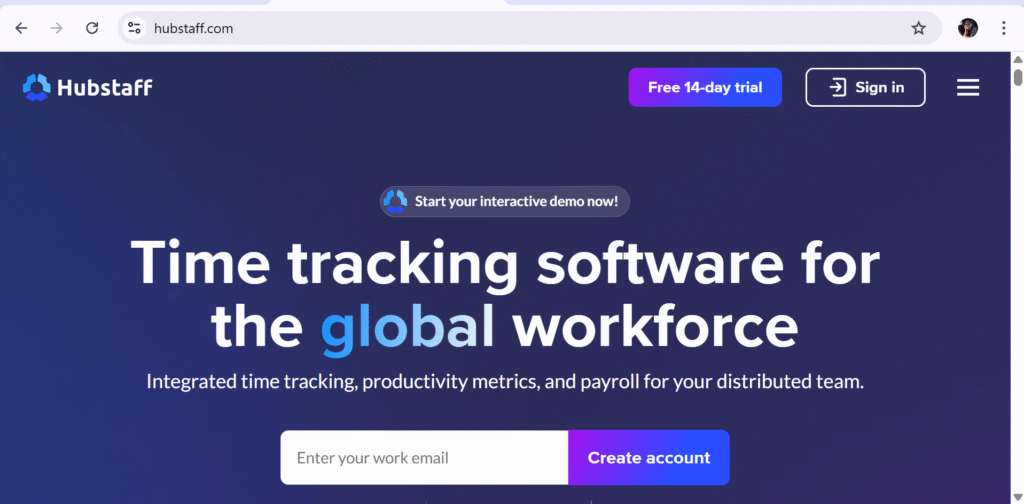
Overview
Hubstaff is a robust time tracking solution focused on helping businesses efficiently manage remote and mobile workforces. Its platform goes beyond simple time logging by including employee monitoring, GPS tracking, and productivity measurement tools, making it a comprehensive solution for teams that work from various locations or on the go.
Features
- Time tracking with screenshots and activity monitoring
- GPS location tracking and geofencing for field teams
- Automated payroll integration with payment processing
- Detailed productivity reports and timesheets
- Project budgeting and expense tracking
Review
Users value Hubstaff for its comprehensive approach that combines time tracking with employee monitoring and GPS, ideal for remote and mobile teams. Its automated payroll saves time for HR departments, and project budgeting features help managers keep projects within scope. However, some employees find the monitoring features invasive, potentially impacting morale. The mobile app offers good functionality but has occasional performance issues.
Pros
- Comprehensive employee monitoring and time tracking
- GPS tracking for field and mobile teams
- Automated payroll and invoicing features
- Extensive reporting and analytics
- User-friendly dashboard and multi-platform support
Cons
- Employee monitoring may feel intrusive
- Higher pricing for full feature access
- Mobile app occasionally buggy
Final Verdict
Hubstaff is a powerful time tracking software in 2025 especially suited for businesses managing remote or field employees who need detailed oversight and productivity tools.
6. RescueTime
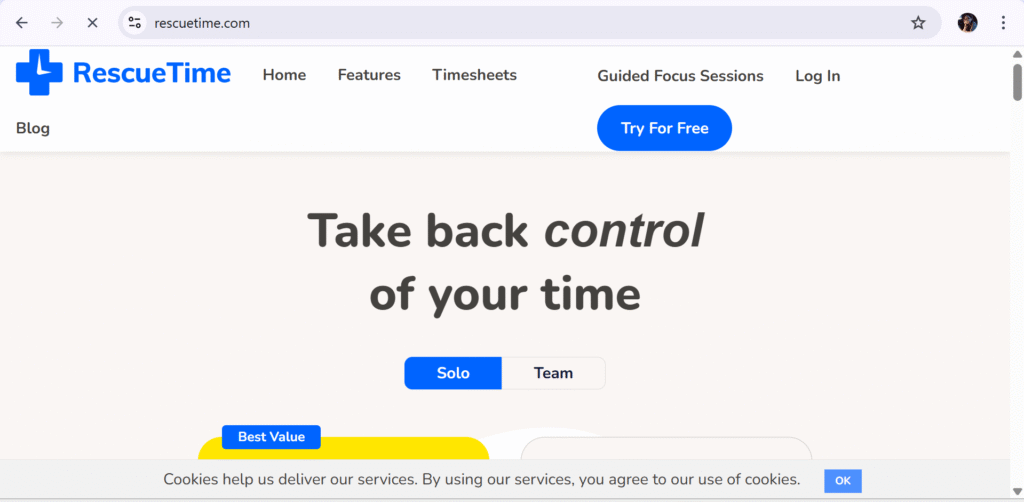
Overview
RescueTime provides automatic time tracking by monitoring computer and mobile device activity to give users and teams deep insights into how time is spent. It’s ideal for professionals looking to improve personal productivity and for businesses wanting to analyze work habits without manual input.
Features
- Automatic tracking of website and app usage
- Productivity scoring and goal setting
- Detailed daily and weekly activity reports
- Alerts and focus tools to minimize distractions
- Integration with calendars and task management tools
Review
Users appreciate RescueTime’s seamless, automatic tracking that requires no manual input. Its productivity reports reveal hidden patterns and time-wasting activities, helping individuals and teams optimize their workday. However, RescueTime is less suited for formal project billing or time-based invoicing, making it a complementary tool rather than a standalone solution. Privacy-conscious users may have concerns over the depth of activity monitoring.
Pros
- Fully automatic, effortless tracking
- Insightful productivity analytics and goal setting
- Helpful distraction alerts and focus tools
- Integrates well with calendars and task apps
- User-friendly interface with clear visualizations
Cons
- Not designed for billing or invoicing
- Lacks team management features
- Some users concerned about privacy
Final Verdict
RescueTime is an excellent time tracking software in 2025 for individuals and teams seeking to understand and improve productivity through automated activity tracking.
7. Time Doctor
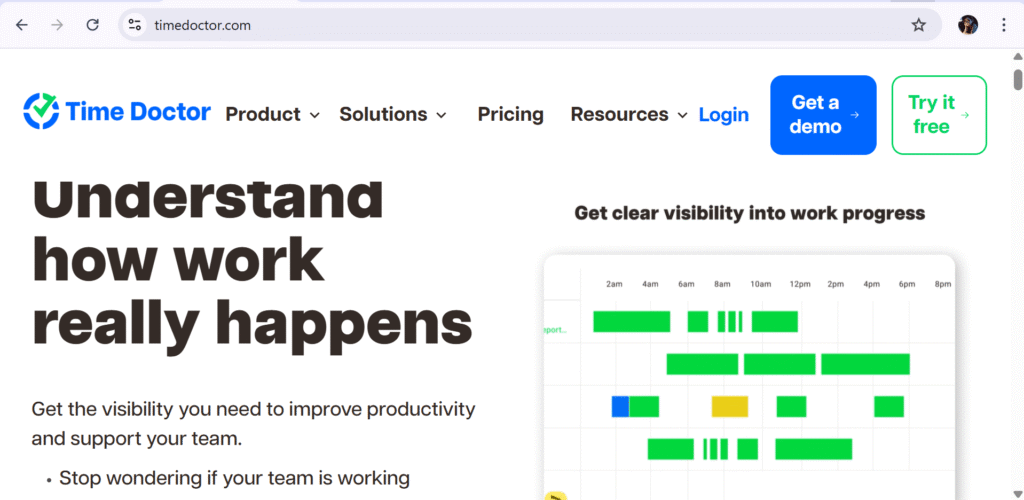
Overview
Time Doctor combines detailed time and attendance tracking with productivity monitoring designed to increase accountability and reduce distractions. It is particularly useful for remote teams and businesses wanting to enhance workforce efficiency with detailed oversight.
Features
- Time tracking with distraction alerts and screenshots
- Website and app usage monitoring
- Payroll and invoicing integrations
- Project and task tracking with budget monitoring
- Attendance and work schedule management
Review
Time Doctor’s detailed monitoring features help managers identify productivity issues and assist employees in focusing on their tasks. Its distraction alerts serve as timely reminders, and payroll integration streamlines payments. Some employees feel the monitoring is intrusive, which may affect morale. The initial setup can be complex, but support resources are helpful.
Pros
- Strong distraction management tools
- Detailed productivity and time tracking
- Payroll and billing automation
- Attendance and schedule management
- Integrations with popular business tools
Cons
- Monitoring features may be seen as intrusive
- Higher price for premium features
- Setup can be complicated for new users
Final Verdict
Time Doctor is a valuable time tracking software in 2025 for managers seeking to boost productivity and maintain attendance discipline, especially in remote teams.
8. FreshBooks Time Tracking
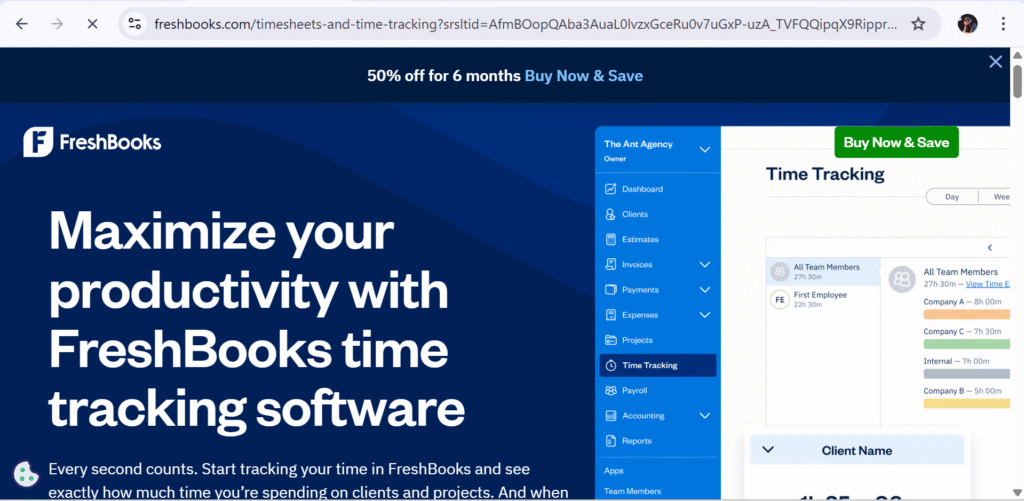
Overview
FreshBooks Time Tracking integrates directly with the FreshBooks accounting platform, making it a seamless solution for freelancers and small businesses that need to track billable hours and simplify client invoicing.
Features
- Time tracking linked to clients and projects
- Automatic time-to-invoice conversion
- Expense tracking and management
- Mobile and desktop apps
- Integration with accounting and payment systems
Review
Users praise FreshBooks for its intuitive interface that ties time tracking to invoicing effortlessly, reducing billing errors and improving cash flow. The software is ideal for small service-based businesses but lacks complex project management features. The mobile app is convenient but occasionally lacks functionality compared to the desktop version.
Pros
- Seamless integration with FreshBooks accounting
- Easy-to-use interface suitable for freelancers
- Automatic invoicing from tracked time
- Expense tracking included
- Cross-platform support (web and mobile)
Cons
- Limited project management capabilities
- No standalone time tracking without FreshBooks
- Mobile app sometimes limited in features
Final Verdict
FreshBooks Time Tracking is perfect for small businesses and freelancers focused on streamlining invoicing and billing with integrated time management.
9. Everhour
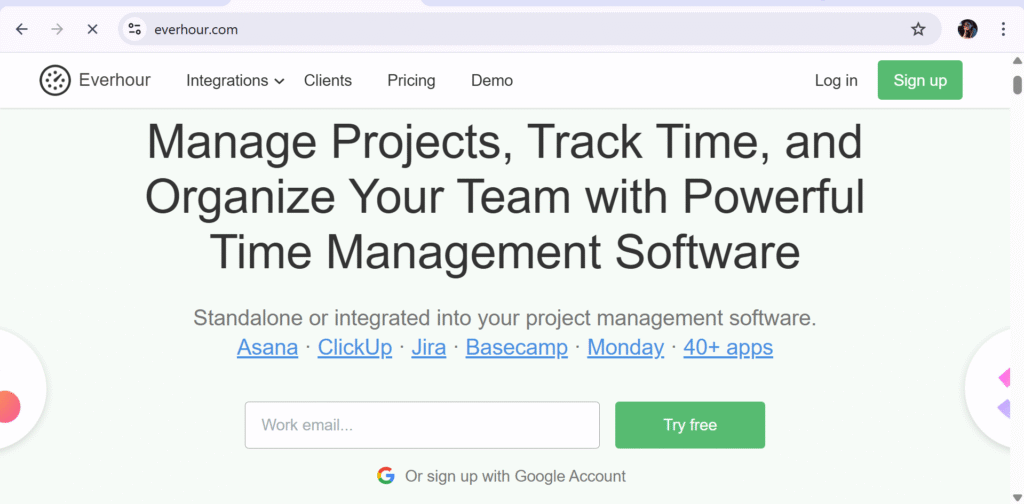
Overview
Everhour is designed to integrate directly with popular project management platforms such as Asana, Trello, and Basecamp, allowing users to track time without leaving their familiar workflow environments.
Features
- Embedded timers in project management tools
- Budget and estimate tracking
- Visual, real-time reporting and dashboards
- Invoicing and expense management
- Role-based access and approvals
Review
Everhour’s integration-focused design eliminates the friction of switching apps, making time tracking a natural part of project management. The budgeting features assist in keeping projects on schedule and within cost. Some users note the lack of offline capabilities and room for improvement in mobile apps.
Pros
- Deep integration with popular PM tools
- Excellent budget tracking and reporting
- User roles and approval workflows
- Real-time visual dashboards
- Easy onboarding and adoption
Cons
- Limited offline functionality
- Mobile apps could be improved
- No standalone project management system
Final Verdict
Everhour is an excellent time tracking software in 2025 for teams wanting powerful tracking embedded in their existing project tools.
10. Timely
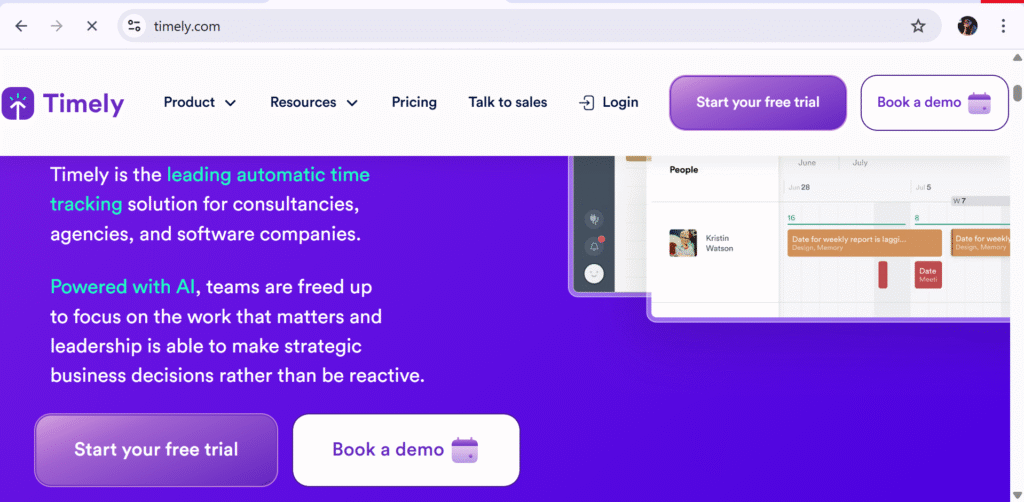
Overview
Timely uses artificial intelligence to automatically track and categorize work hours, reducing the need for manual entry and increasing accuracy. Its privacy-first design respects user data while providing deep insights.
Features
- Fully automatic AI time tracking
- Project and client time categorization
- Calendar integration and scheduling
- Team time management and reporting
- Privacy-focused with no screenshots
Review
Timely’s automated tracking frees teams from manual time entry, improving accuracy and reducing administrative overhead. Users enjoy the calendar sync and privacy safeguards. However, the reliance on automation means manual adjustments can sometimes be cumbersome, and pricing is higher than manual trackers.
Pros
- Completely automatic and accurate time tracking
- Strong scheduling and calendar sync
- Privacy-first approach without intrusive monitoring
- User-friendly interface with actionable insights
- Suitable for distributed and hybrid teams
Cons
- Limited manual tracking flexibility
- Higher cost relative to manual tools
- Heavy reliance on integrations for expanded features
Final Verdict
Timely is ideal for businesses prioritizing automation, privacy, and accurate time tracking with minimal manual effort.
11. ClickTime
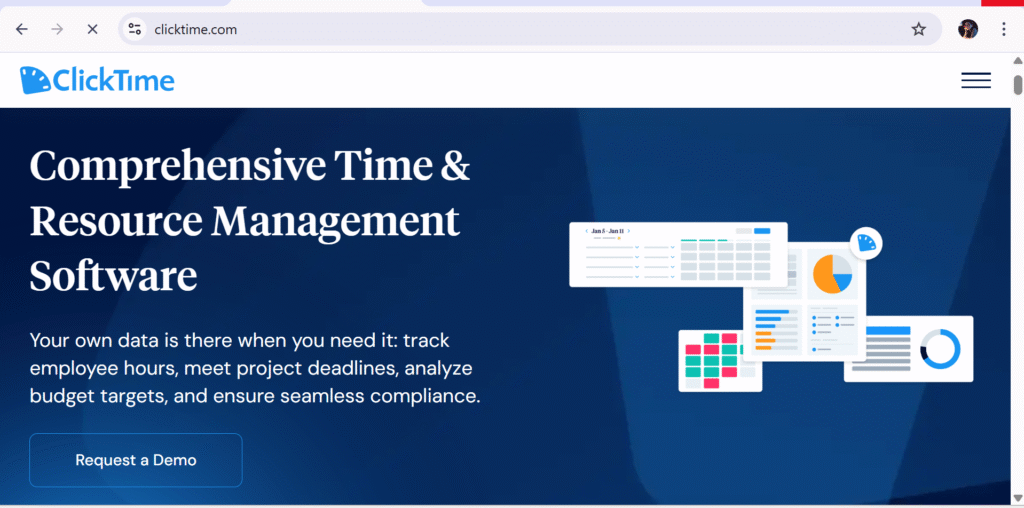
Overview
ClickTime offers powerful tools combining time tracking with resource planning and budgeting, making it ideal for agencies and professional services managing multiple projects and clients.
Features
- Time tracking with project budgeting and forecasting
- Resource allocation and utilization planning
- Expense tracking and approval workflows
- Customizable reporting and dashboards
- Payroll and accounting software integrations
Review
Users appreciate ClickTime’s depth in budgeting and resource management, allowing them to control project costs and staff workloads effectively. The software’s extensive reports help improve decision-making. Some users mention a learning curve due to the platform’s complexity and a dated user interface.
Pros
- Advanced project budgeting and forecasting
- Detailed resource allocation tools
- Comprehensive expense and approval features
- Strong reporting capabilities
- Integrates well with payroll and accounting systems
Cons
- Steep learning curve for new users
- Outdated user interface compared to competitors
- Higher price point
Final Verdict
ClickTime is well-suited for organizations needing powerful budget and resource planning alongside time tracking.
12. Monday.com Time Tracking
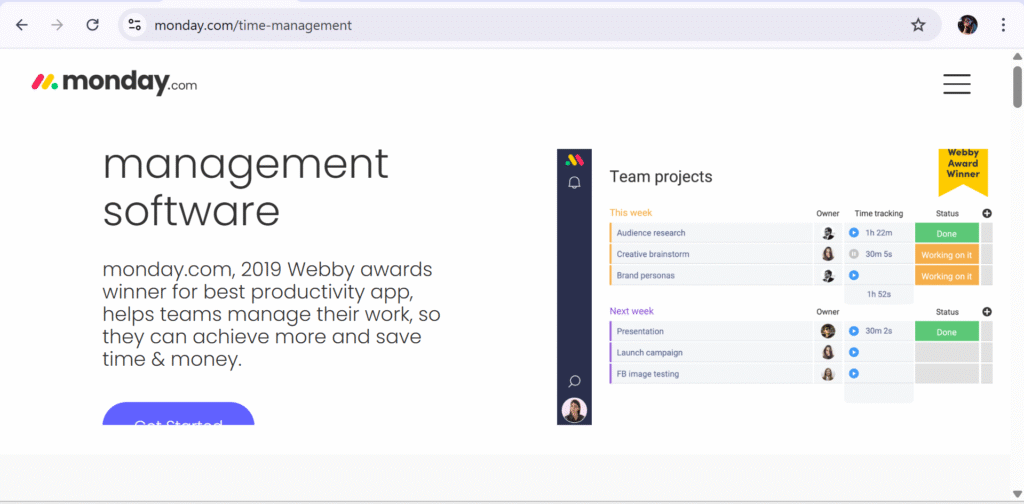
Overview
Monday.com offers built-in time tracking as part of its versatile work operating system, enabling teams to log hours directly on project boards while benefiting from extensive collaboration and automation features.
Features
- Time tracking on individual tasks
- Visual project timelines and workload views
- Automation of routine tasks and reminders
- Team collaboration and communication tools
- Integration with popular business apps
Review
Users enjoy the seamless integration of time tracking into Monday.com’s broader project and workflow management environment. The visual tools enhance team coordination and transparency. Time tracking features, however, remain basic compared to specialized tools, and pricing can be steep if only used for tracking.
Pros
- Fully integrated with project and task management
- Visual and collaborative interface
- Custom automation features
- Easy team communication
- Wide integration ecosystem
Cons
- Basic time tracking features
- May be expensive for simple time tracking needs
- Learning curve for full platform use
Final Verdict
Monday.com is ideal for teams wanting to embed simple time tracking into a comprehensive work management platform.
13. Paymo
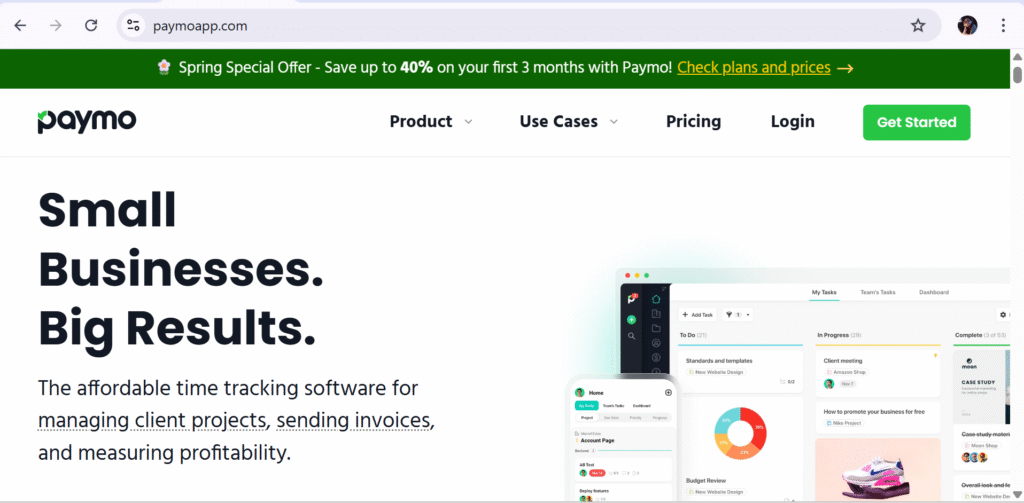
Overview
Paymo is an all-in-one work management platform combining project management, time tracking, billing, and team collaboration, suitable for small and mid-sized businesses and creative agencies.
Features
- Task and project management with Gantt charts
- Time tracking with timers and manual input
- Invoicing and expense tracking
- Team collaboration tools including file sharing
- Reporting and analytics dashboards
Review
Paymo users appreciate the unified approach, reducing the need for multiple apps. Its time tracking integrates well with project workflows and billing, helping agencies manage clients efficiently. The mobile app could be more stable, and reporting lacks some depth for large organizations.
Pros
- Integrated project management and time tracking
- Easy invoicing and expense management
- User-friendly interface
- Collaboration and file sharing tools
- Responsive customer support
Cons
- Mobile apps require improvement
- Reporting not as advanced as standalone tools
- May be complex for very small teams
Final Verdict
Paymo is a solid time tracking software in 2025 for businesses seeking integrated project, time, and billing management.
14. Zoho Projects Time Tracker
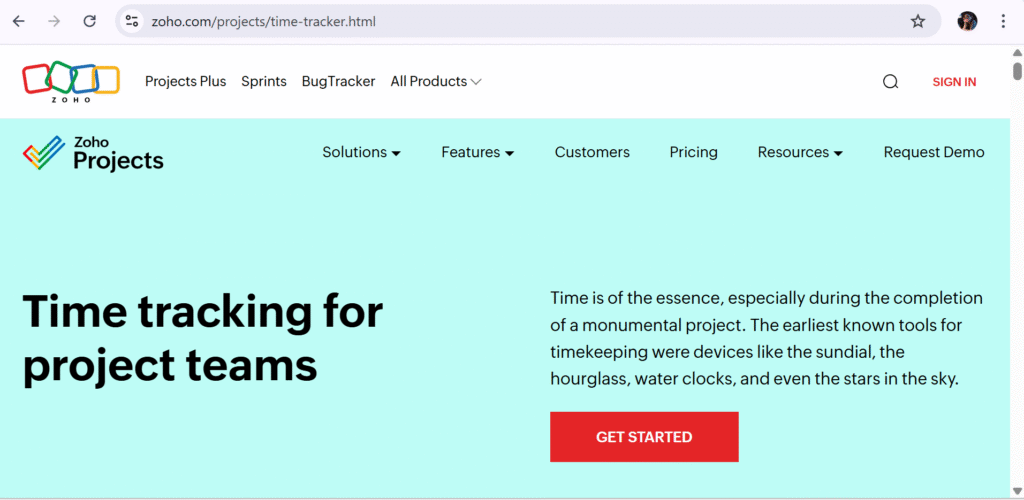
Overview
Zoho Projects includes time tracking as part of its project management suite, offering teams an integrated environment to manage tasks, collaborate, and monitor time spent on various activities.
Features
- Time tracking by task and project
- Timesheet submissions and approval workflows
- Customizable reports and analytics
- Integration with Zoho CRM, Books, and other apps
- Mobile applications for on-the-go tracking
Review
Users like Zoho Projects for its all-in-one approach, connecting time tracking with project planning and invoicing within the Zoho ecosystem. The interface offers comprehensive tools but can feel cluttered. Mobile apps work well but sometimes lack full desktop feature parity.
Pros
- Seamless integration within Zoho suite
- Flexible timesheet and approval features
- Good mobile app support
- Robust project management tools
- Affordable pricing
Cons
- Can be overwhelming for new users
- Less advanced reporting options
- Some features locked behind premium plans
Final Verdict
Zoho Projects is a great option for businesses already using Zoho tools needing integrated project and time tracking.
15. HubSpot Time Tracking
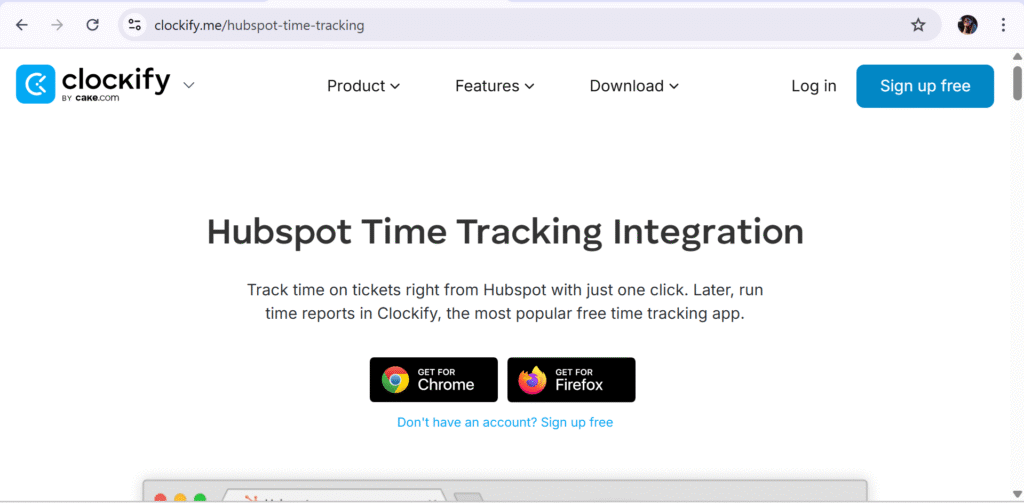
Overview
HubSpot Time Tracking is integrated with the HubSpot CRM, allowing sales and service teams to log time spent on client interactions, enhancing customer management and operational visibility.
Features
- Time tracking linked to CRM contacts and deals
- Task and activity logging for sales and support
- Reporting on time spent by deal or client
- Mobile and desktop access
- Integration with HubSpot’s marketing and sales tools
Review
HubSpot users find the time tracking feature useful for accurately capturing billable hours and improving transparency with clients. It’s particularly beneficial for sales-driven teams already using HubSpot’s CRM. However, it lacks deep project or resource management functionality.
Pros
- CRM-integrated time tracking for client work
- Simple to use for sales and support teams
- Real-time activity logging and reporting
- Mobile-friendly
- Integrates smoothly with HubSpot ecosystem
Cons
- Limited project/time management outside CRM tasks
- Requires HubSpot CRM subscription
- No invoicing or billing features
Final Verdict
HubSpot Time Tracking is best suited for sales and customer service teams wanting to capture time within a CRM environment.
16. actiTIME
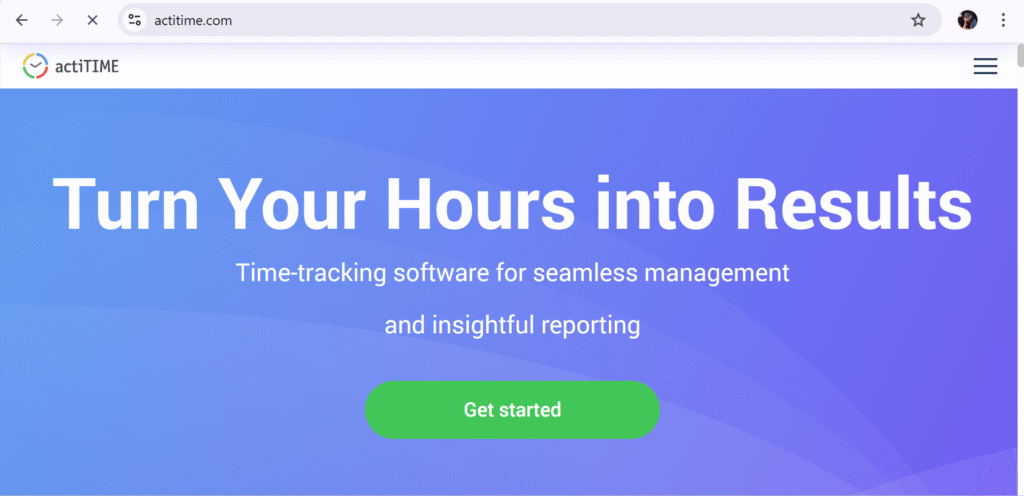
Overview
actiTIME is a customizable time tracking and project analytics platform designed for teams requiring detailed task tracking, budget control, and reporting. It serves professional services, IT firms, and businesses with complex workflows.
Features
- Task and project-based time tracking
- Budget and cost management
- Leave and attendance tracking
- Custom reports and dashboards
- Integration with accounting and project management tools
Review
Users value actiTIME’s extensive customization options and in-depth reporting, allowing tight control over project budgets and resource utilization. While setup and training require effort, the payoff is improved financial and operational insight. The interface could be more modern and user-friendly.
Pros
- Highly customizable to fit complex workflows
- Detailed budget and cost tracking
- Attendance and leave management
- Robust reporting and analytics
- Good integration options
Cons
- Requires time to set up and learn
- Outdated user interface
- Can be overwhelming for small teams
Final Verdict
actiTIME is a powerful time tracking software in 2025 for organizations needing granular control over time, budgets, and attendance.
Conclusion:
In 2025, time tracking software is an indispensable tool that empowers organizations to gain transparency, improve productivity, and streamline billing processes in increasingly complex work environments. From freelancers seeking simple tracking to enterprises requiring integrated project, billing, and resource management, there is a solution tailored for every need.
Choosing the right time tracking software not only saves hours of manual administrative work but also provides actionable insights that enable smarter workforce management and better client relationships. With remote and hybrid work becoming the norm, accurate time tracking supports fairness and accountability while helping businesses adapt to new operational realities.
The platforms featured in this guide represent the best of the market in terms of usability, scalability, features, and value. Investing in a robust time tracking solution today is a critical step toward sustained growth, optimized workflows, and improved profitability in 2025 and beyond.
Frequently Asked Questions (FAQs)
What is the best time tracking software for small businesses in 2025?
For small businesses, Clockify and Toggl Track are excellent choices. They both offer free plans that support unlimited users, providing an easy and cost-effective way to track time and improve productivity. These tools are perfect for businesses that don’t need complex features but still require powerful reporting and analytics.
How can time tracking software improve team productivity?
Time tracking software helps teams identify time-wasting activities, optimize workflows, and ensure that resources are being used efficiently. By providing real-time insights into where time is being spent, teams can focus on high-priority tasks, reduce idle time, and enhance overall productivity.
Is time tracking software suitable for remote teams?
Yes, many modern time tracking tools like Hubstaff and Time Doctor are specifically designed for remote teams. These platforms offer features such as GPS tracking, activity monitoring, and real-time collaboration tools, making it easy to manage remote teams and ensure productivity from any location.
Can time tracking software integrate with project management tools?
Most of the best time tracking software, such as Everhour and Toggl Track, seamlessly integrates with popular project management tools like Asana, Trello, and Jira. This allows teams to track time directly within their project boards, streamlining workflow and providing a clearer picture of project timelines and resource allocation.
Does time tracking software help with client billing?
Yes, several time tracking tools such as Harvest and FreshBooks Time Tracking are designed to automatically convert tracked hours into invoices. This eliminates the need for manual calculations, improves billing accuracy, and ensures timely payments, which is especially helpful for freelancers and service-based businesses.
